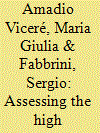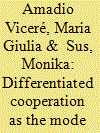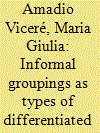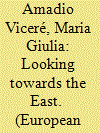|
|
|
Sort Order |
|
|
|
Items / Page
|
|
|
|
|
|
|
| Srl | Item |
| 1 |
ID:
154838


|
|
|
|
|
| Summary/Abstract |
The 2009 Lisbon Treaty institutionalised an intergovernmental constitution for managing policies traditionally a matter of national sovereignty, such as foreign and defence policies. However, important innovations were introduced in the foreign policymaking structure to limit its intergovernmental logic, in particular, with regard to the role of the High Representative (HR). It was generally assumed that those innovations would have made development of a coherent EU foreign policy possible. Yet, in one of the most significant tests for the EU’s foreign and defence policies in the post-Lisbon era, namely the Egyptian crisis (2011-14), those reforms did not work as expected. Notwithstanding the innovations, the HR’s role was diminished by the European Council’s strict control over foreign policy toward Egypt. The lack of clear policy guidelines towards the issue of democratisation in the Arab world in the 2003 European Security Strategy, although partially mitigated by the European Neighbourhood Policy and the Barcelona Process/Union for the Mediterranean, made it even more difficult for the HR to bring a European perspective into the largely intergovernmental setting.
|
|
|
|
|
|
|
|
|
|
|
|
|
|
|
|
| 2 |
ID:
190064


|
|
|
|
|
| Summary/Abstract |
While the standard conceptualization of differentiation in the European Union (EU) focuses on differentiated integration, scholars devote less attention to differentiated cooperation. This article argues, on the contrary, that member states’ engagement in differentiated efforts in EU foreign policy manifest themselves both in the form of differentiated integration and cooperation. It elaborates an original conceptual framework for exploring differentiated cooperation as a mode of governance. Drawing on the articles in this special issue, this introduction maps empirical manifestations of differentiated cooperation in various areas and dimensions of EU foreign policy. The results of the special issue show that differentiated cooperation has mostly manifested itself in informal patterns of cooperation, with the treaty-based mechanisms being limited. As such, the special issue reflects the differentiation and informalization processes occurring not only in the EU, but also in global governance more broadly.
|
|
|
|
|
|
|
|
|
|
|
|
|
|
|
|
| 3 |
ID:
181662


|
|
|
|
|
| Summary/Abstract |
Despite the Lisbon Treaty's modifications in the foreign and security policy domain, the EU has frequently relied on third parties to address external conflicts and crises. Using the Ukrainian conflict as a case study, this article adopts the orchestration model to explain why and how the EU enlists intermediary actors over which it has no formal control to pursue its objectives. It finds that in this conflict the EU outsourced part of its crisis management activities to the Organization for Security and Co-operation in Europe because it lacked the civilian and military capabilities, as well as the regulatory competence and reputation to challenge Russia. Indeed, the Ukrainian case shows that orchestration has emerged as a crucial governance arrangement for the functioning of EU crisis management, raising serious questions about the EU overall capacity to act as a security provider in an international system marred by contestation and hard security concerns.
|
|
|
|
|
|
|
|
|
|
|
|
|
|
|
|
| 4 |
ID:
190065


|
|
|
|
|
| Summary/Abstract |
Although informal groups of member states often steer EU foreign policy, existing scholarly literature does not offer an overarching theoretical approach to account for their causes and their different types. This article conceptualizes informal groupings and offers a theoretical approach that explains their occurrence in EU foreign policy. It claims that while disagreements among member states and the lack of EU capacity are the main causes of informal groupings, the combination of these two factors over time and across different policy issues determines the emergence of specific types of informal groupings in EU foreign policy. Indeed, evidence from Kosovo, Libya, and Syria shows that different types of informal groups addressed various policy issues by replacing, complementing and/or supporting corresponding EU policies. Nonetheless, as these groupings lack central guidance and accountability mechanisms, they are not a panacea for EU foreign policy.
|
|
|
|
|
|
|
|
|
|
|
|
|
|
|
|
| 5 |
ID:
174570


|
|
|
|
|
| Summary/Abstract |
My article addresses the role of the two post-Lisbon High Representatives (HRs), Catherine Ashton and Federica Mogherini, in EU approach to the Eastern neighbourhood. Adopting a broad conceptualisation of EU foreign policy and drawing on the scholarly literature on new intergovernmentalism, it focuses on events that marked the HRs' mandates in the cases of Kosovo and Ukraine. In the case of Kosovo, it examines the HRs' role in the conclusion of the so-called Brussels Agreement (April 2013); and of the August 2015 agreements. In the case of Ukraine, it reconstructs how the HRs dealt with the events leading up to the November 2013 Vilnius Summit; and with those leading up to the conclusion in February 2015 of the Minsk II Agreement. The article argues that the European Council exerts tight control over the post-Lisbon HR, and EU foreign policy-making processes more generally. Nonetheless, the empirical analysis demonstrates that, under certain circumstance, the HR can significantly influence EU foreign policy in the post-Lisbon era.
|
|
|
|
|
|
|
|
|
|
|
|
|
|
|
|
| 6 |
ID:
174566


|
|
|
|
|
| Summary/Abstract |
The Lisbon Treaty recently celebrated its 10th anniversary. The 2009 legal text was an attempt to enhance the unity, consistency and effectiveness of the EU’s action in an increasingly volatile world. And yet, the post-Lisbon time period has been characterised by multiple crises coming from the West, the East, the South, and even from within the EU. Against this backdrop, our Special Issue makes a systematic assessment of the EU's foreign policy post-Lisbon and of its evolution by focusing on the role of the High Representative of the Union for Foreign Affairs and Security Policy (HR/VP). Assessing the post-Lisbon HR/VPs provides important insights on EU foreign policy processes over the past decade. In this introduction, we discuss the three research questions that guide our collection of articles, as well as our theoretical and empirical contribution to existing scholarly literature.
|
|
|
|
|
|
|
|
|
|
|
|
|
|
|
|
|
|
|
|
|